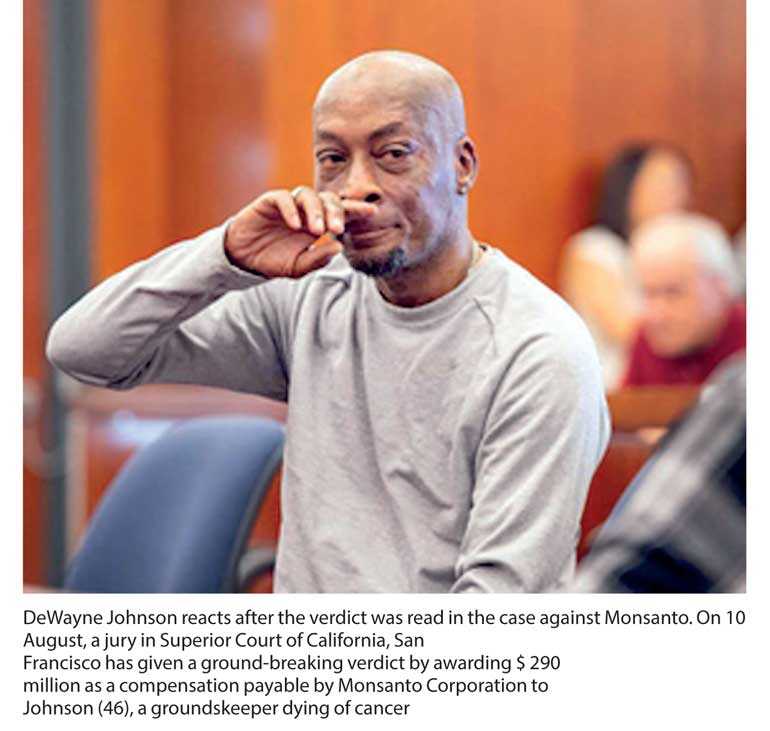Tuesday Feb 10, 2026
Tuesday Feb 10, 2026
Wednesday, 5 September 2018 00:00 - - {{hitsCtrl.values.hits}}

 Regulatory capture and the influence of powerful transnational corporations in lobbying the policy makers towards their own advantage is no secret. Putting profits before people and planet is their ordinary course of business.
Regulatory capture and the influence of powerful transnational corporations in lobbying the policy makers towards their own advantage is no secret. Putting profits before people and planet is their ordinary course of business.
The first draft of the legally binding treaty; to regulate in International Human Rights Law in the activities of transnational corporations (TNC) and other business enterprises (OBE) was submitted on 16 July to the UN High Commission of Human Rights.
On 10 August, a jury in Superior Court of California, San Francisco has given a ground-breaking verdict by awarding $ 290 million as a compensation payable by Monsanto Corporation to DeWayne Johnson (46) groundskeeper dying of cancer. Jurors took into consideration failure of Monsanto Corp producers of weed killer ‘Round UP’ – which contain its main chemical ingredient Glyphosate – to warn Johnson and other users about the possibility of cancer creating properties that are used in its weed-killing herbicide. Bayer the German chemical company which now owns Monsanto Corp has gone to media and stresses that their chemicals including Round-UP are not injurious to users and planning to appeal against the verdict given by the jury in California.
Methyl Isocyanate leak in the Union Carbide factory in Bhopal, India in 1984 killed almost 3,787 lives. The government of India estimates that the total causalities of the tragedy are around 15,000 human beings plus livestock. Toxic material remains, even 30 years later, many of those who were exposed to the gas have given birth to physically and mentally disabled children. Business and Human Rights Resource Centre website report, still a sum approximately to the tune of $ 330 million yet to be distributed to the victims to date, out of the Indian Supreme Court approved the settlement as compensation payment of $ 470 million in 1989.
In an interview after the California judgement, a senior official of Monsanto reveals that there are over 800 scientific researches done and which confirms that Glyphosate does not create cancer and it is safe to use. Quite the contrary the World Health Organization (WHO) warns that Glyphosate may cause cancer amongst the users of the herbicide. But, the USA and EU do not subscribe to WHO warnings. UN’s International Agency for Research on Cancer (IARC) declared in March 2015 that glyphosate probably, and raises the risk of cancer in people exposed. Accordingly, UN IARC declares Glyphosate as a probable human carcinogen; a substance capable of causing cancer in living tissue.
At the 26th session of the UN Human Rights Council, in July 2014, the resolution was adopted for the introduction of a legally binding instrument on Trans National Corporations (TNC) and Other Business Enterprises (OBE) with respect of human rights. The main focus of the proposed treaty was emphasising that transnational corporations and other business enterprises have a responsibility to respect human rights, and civil society actors have an important and legitimate role in promoting corporate social responsibility and in preventing, mitigating and seeking remedy for the adverse human rights impacts of TNCs and OBEs.
What is interesting to note is; the original resolution put forward by Ecuador in 2014 was adopted after a vote 20 in favour, 14 voting against? Many human rights champion nations such as France, Germany, Ireland, Italy, Japan, the UK and the USA voted against the motion. In spite of their objections, the resolution was passed with the support of countries including China, India, Indonesia, Russia, South Africa and Vietnam.It is important to remember that scientific research can prove and provide answers to numerous how, what, when and where questions explaining causes and effects scientifically depending on how the research questions are framed; but science has serious limitation to give a credible explanation to the natures why question accurately. Let us also take the fact into account, that the two weeds that have conquered the human civilisation from grass family are the rice and wheat crops. These two weeds have evolved for generations with scientific hybrids and feed and energise the majority of the global population. It is also interesting to note that extra sensitivities of genetically modified crops towards glyphosate another agricultural input monopolised by TNCs. These agricultural inputs are banned in many countries and discouraged their usage.
Monsanto Corporation introduced Round-UP in 1974; the key ingredient of the weedicide Glyphosate kills weeds by blocking proteins essential to plant growth. National water quality assessment program conducted by the US Geological Survey has found glyphosate sediments in the majority of rivers, streams, ditches, and wastewater treatment plant outfalls tested in 38 states in the USA.
Rice is the staple food in many Asian countries, and it is grown in marshy land and regularly irrigated through a multitude of sources. Round-UP weedicide is extensively used in tea and rubber plantations in many countries such as Sri Lanka. Rainwater can wash away Glyphosate sediments of – the main ingredient of Round Up and get contaminated with the water that irrigates the paddy fields in low land areas. Sri Lanka banned the import of Glyphosate sometime back, and recently the government has lifted the ban amidst heavy criticism by the environmental friendly groups in media.
It is high time that Sri Lankan scientist, agronomist carry out their own independent research studies to factually identify the correlations that exist between these agricultural inputs and their long-term impacts on the ecology and health of the farmers and the consumers. As there may be possibilities of glyphosate contaminated water impeding the protein absorptions in paddy plants reducing their crop yields, forcing the farmers to add in synthetic fertilisers in large quantities. Ceylon Petroleum Corporation reports that the annually they import approximately one million litres of Round-UP.
Farmers in Sri Lanka are grappling with price escalation of synthetic fertiliser, without the usage of fertiliser their crops do not yield to cover the costs, and they are compelled to use increasing quantities degrading the environmental impact. Farmland soil is now addicted to these synthetic fertilisers which are by-products of the petroleum industries another group of powerful TNC lobby. A similar situation may be prevalent in many other rice-growing countries in Asia.
Excessive consumption of sugar-related food is a serious concern for the wellbeing of the global community. Obesity, diabetics are major health concerns in the developed and developing the world. There is enough scientific research to prove addictions to the fast food culture and sugar based carbonated soda drinks are the contributory factors to these causes. Sugar is another carcinogen causing cancer amongst many victims. Yet in many of the soda drinks cans sold in markets do not indicate sugar as an ingredient instead they term it as ‘energy’ to deceive the consumer sans any warning to the users.
These cases highlight the trends in holding powerful superior multinational corporations accountable for actions, which Coca-colonised the consumer markets and behaviours by putting their profits before people and planet. Profit motives and market share of many TNCs as reported in media supersede sustainable development goals of the marginalised communities.
In this era of acceleration, propelled by the 4th Industrial Revolution, will fleas be empowered to trample elephants? Charles Handy, in his bestselling book ‘The Elephant and the Flea – Reflection of Reluctant Capitalist’ suggests that this could be a reality.